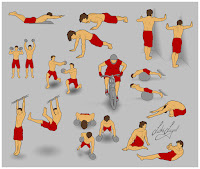Our Modern Society is vulnerable to all kinds of
chronic degenerative diseases such as heart disease, diabetes, stroke, cancer, etc. Particularly, among the young is daunting. Thanks to increasing stressful life, pollution, changing dietary habits, and increasing sedentary lifestyles, making more and more people in the early 20s and 30's the most dreaded condition in life — a heart attack. Obesity, being the mother of all chronic
diseases is the primary cause of heart disease. Although with all advancement in
medical sciences, today's lifestyle is more a bane than a boon to an individual.
How heart disease occurs
 |
| Image: © CreVis2/Getty Images |
Every part of our body requires nutrition, it comes from the blood pumped by the Heart after being oxygenated by the Lungs. Similarly, Heart Muscles too, require blood to function which is supplied by Coronary Arteries.
The hardening and narrowing of these
arteries (Atherosclerosis) cause heart disease. Cholesterol is the most dreadful factor that
leads to it.
 Persistently
high cholesterol (importantly Low-density Cholesterol), may trigger a series of events that result in the plaque
formation in the inner walls of the arteries. Thus arteries get choked and blood flow to the heart slows down, thus
reducing the supply of oxygen and other nutrients required to the heart.
Persistently
high cholesterol (importantly Low-density Cholesterol), may trigger a series of events that result in the plaque
formation in the inner walls of the arteries. Thus arteries get choked and blood flow to the heart slows down, thus
reducing the supply of oxygen and other nutrients required to the heart.
As a result, when a major artery gets completely blocked, it leads to a Myocardial Infarction (Myo; (Muscle) - Cardia; (Heart) - Infarction; (Blockage)) or Heart Attack. When it happens, it causes irreversible damage to the affected portion of the heart devoid of blood supply. Subsequently reduces the efficiency of the pumping by Heart.
How to keep heart disease at Bay
Prevention is Beyyer than Cure. In today's fast-moving world. There are two main factors, Hereditary and Lifestyle Factors which put us prone to Heart Diseases. One can't do much on Hereditary factors but can sure control Lifestyle factors which actually is the major reason for Heart Diseases
1) Follow a standard exercise regime.
The sophisticated
gadgets have lessened the burden of strenuous work that involves a lot of muscular activity. Thus
increased mechanization led to a sedentary lifestyle, which is one of the
reasons for the prevalence of heart disease.
2) Control Stress.
 Today we live in a highly competitive and stressful world with a lot of deadlines to meet. One has to resort to methods of
easing themselves from stress by doing yoga, besides aerobic exercises and
meditation, brisk walking, cycling, jogging, swimming, running, and jumping
rope.
Today we live in a highly competitive and stressful world with a lot of deadlines to meet. One has to resort to methods of
easing themselves from stress by doing yoga, besides aerobic exercises and
meditation, brisk walking, cycling, jogging, swimming, running, and jumping
rope.
This myriad physical activity, which is the most neglected aspects of
healthful living, lowers blood pressure, controls weight, improves blood
circulation, increases levels of high-density lipoproteins (the 'good'
cholesterol) in blood, and lowers stress. This also possibly leads to longevity, delays the process of aging. Also talking and sharing things with family and friends reduces stress.
Besides this activity, recreational activities, such as dancing, listening to
music, vacationing, etc also ease our tensions.
3) Improve upon the diet
Besides moderate physical activity, dietary habits
play a vital role in the prevention of heart disease.
 We must avoid trans fats
or hydrogenated vegetable oil that lowers HDL or good cholesterol. We must also
avoid re-heating or re-using the same oil which is already heated. It is
because it leads to the production of trans-fatty oils. These trans-fatty oils
can be found in our favorite snacks like samosas, bhajis, and bakery
products. A classic example of this is Vanaspati ghee. Saturated fats increase plasma cholesterol levels and clot formation in the blood
vessels. These are mainly present in animal foods like meat, whole milk, and
milk products produced from it and in some vegetable oils viz.
coconut, palm, and palmolein oil.
We must avoid trans fats
or hydrogenated vegetable oil that lowers HDL or good cholesterol. We must also
avoid re-heating or re-using the same oil which is already heated. It is
because it leads to the production of trans-fatty oils. These trans-fatty oils
can be found in our favorite snacks like samosas, bhajis, and bakery
products. A classic example of this is Vanaspati ghee. Saturated fats increase plasma cholesterol levels and clot formation in the blood
vessels. These are mainly present in animal foods like meat, whole milk, and
milk products produced from it and in some vegetable oils viz.
coconut, palm, and palmolein oil.
Unsaturated fatty oils are beneficial to the
heart. There are two types: PUFA (Poly-unsaturated fatty acid) and MUFA (Mono-unsaturated fatty acid). These are known to reduce serum
cholesterol levels.
PUFA: Safflower (kardi), Sunflower, Corn
and Soybean oil;
MUFA: Liver, Groundnut, and Canola oil are rich sources of
Fish oils also contain low-chain known as Omega-3 fatty
acids.
Fibre, soluble, non-soluble which is found in plant foods plays a role
in preventing heart disease. They are found in oats, cluster beans, lentils,
whole grains, and fruits like apple, guava, and pear.
Some plant foods have
phytochemicals that can neutralize free radicals. Thus they are antioxidants.
Foods rich in antioxidants are fresh fruits, and vegetables. Beta Carotene,
Vitamin C and E, minerals like Selenium, iron, Copper, and Zinc, are richly
found in these. Green tea, black tea, colored fruits, and vegetables, onion,
garlic, cauliflower, cabbage, broccoli, and soybean are also rich in
antioxidants.
Thus to keep your Heart, beat healthily, adopt a simple lifestyle, including physical activity, perform yoga, and meditate to have a
stress-free schedule. Above all, less sugar, and fat-free food protect
you from many problems. Home-cooked food with the above safety measures is the
best panacea for a healthy life.
29th September Every Year is Celebrated as World Heart Day
Source: Wisdom by Dr. K.V. Govinda Rao, Encyclopedia, Pinterest, Wikipedia

